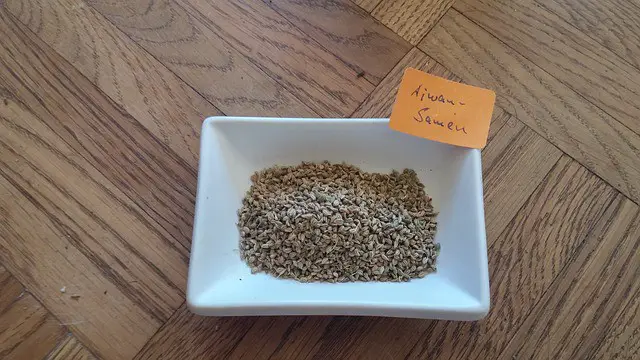Ajwain (pronounced AHJ-a-wahn) is a herb that produces both leaves and a fruit that is used in food dishes and for health purposes. The Ajwain fruit appears to look like a seed and is often referred to as such.
Ajwain is also known as carom seeds or bishop’s weed and is largely grown and used in India in both popular food dishes and for medical purposes. Ajwain has a strong smell and bitter taste and although it looks like cumin or caraway seeds, tastes more like thyme which is one popular substitute. Purported to have many benefits including antibacterial and anti-inflammatory effects, it is popular in Indian medicine for its high level of antioxidants, vitamins and minerals in both powder form and as a drink.
Ajwain Benefits In Cuisine
Ajwain is used in a wide variety of food dishes especially in India and the Middle East. It is first dry roasted and crushed before being used in powder form and is rarely consumed raw. While it smells similar to thyme which is often used as a substitute, ajwain is stronger than thyme and is often compared taste wise to anise and oregano.
Indian cuisines often use ajwain in dishes including curry, masala, beans, roti, samosas, naan and other flatbreads. It is often also used in desserts to add flavor to pastries and other breads. You will see ajwain used in many deep fried foods with rice or chickpeas as well as vegetable dishes with potatoes and green beans. It can be used in a variety of meats too such as chicken and beef as well as fish dishes.
Middle Eastern dishes also use ajwain to provide a distinct taste and to add flavor to rice and meat dishes. It may also be used to pickle foods and in chutneys and jams. So in that regard, it has a wide range of food uses particularly when you’re looking for some bitterness with a strong flavor and aroma.
Ajwain Seeds Benefits
Ajwain has long been used in Indian medicine as an antiseptic and also for gastrointestinal purposes. Indians have long added hot water to ajwain to use as a beverage to assist with bowel pain and to improve digestion.
Studies have also shown ajwain seed oil has the ability to inhibit Candida albicans (yeast) growth and act as an antifungal. More specifically ajwain has been shown to exhibit a number of medicinal benefits as a(n):
- antifungal
- antioxidant
- antimicrobial
- antinociceptive
- cytotoxic
- hypolipidemic
- antihypertensive
- antispasmodic
- broncho-dilating actions
- antilithiasis
- diuretic
- abortifacient
- antitussive
- nematicidal
- anthelmintic
- antifilarial
Source: NCBI

Ajwain Seed Analysis
Ajwain seeds have the following nutritional breakdown:
| Component | Chemistry |
| Fiber | 11.9% |
| Carbohydrates | 38.6% |
| Tannins, glycosides, moisture | 8.9% |
| Protein | 15.4% |
| Fat | 18.1% |
| Saponins, flavone and mineral matter | 7.1% |
Ajwain is high in fiber and carbs but also in both protein and fat.
Ajwain produces an oil which is high in thymol which gives ajwain its antibacterial, antifungal and antiviral properties. Thymol is also a commonly used ingredient in mouthwashes as a result.
Thymol is also commercially used in a wide variety of products including cough drops, ointments and pesticides among others.
Ajwain Tea
Another popular use of ajwain is to add it to boiled water to use as a tea. Ajwain tea has long been used in India for weight loss and also for help with digestion, lowering acidity, coughs, colds and gas.
The suggested serving is to soak 1/2 tablespoon of ajwain seeds and 1 tablespoon of cumin seeds (Jeera) in water overnight. In the morning, boil the water, strain the tea and add lemon and ginger it desired and drink it.
Some people add a bit of salt and if the drink is desired right away, you can also boil the water and seeds and consume shortly thereafter rather than soaking the seeds overnight.
Ajwain Alternative Names
Although ajwain is actually a fruit, it does resemble a seed and is generally referred to as such. While it comes in both whole and ground form, some people prefer to grind it themselves when it’s needed prior to cooking. Ajwain is typically used as a spice and although it comes from the same family as both cumin and dill, it tends to be compared to thyme and oregano.
When looking for ajwain, you may see it listed under different names including:
- Carom seeds
- Bishop’s weed
- Ajowan caraway
- Ajava seeds
Substitutes
While dried thyme is commonly substituted, you can also use oregano in place of ajwain but do be careful as some oregano is stronger than others. While many believe that Greek oregano is the best in the world it’s also stronger than other types such as Mexican oregano. If you use Greek oregano, reduce the amount specified in the recipe and then adjust for personal taste.
Ajwain vs Oregano


Is ajwain the same as oregano? You often see ajwain and oregano mentioned in the same sentence, sometimes going as far to say that ajwain is the Hindi name for the English word oregano. This is not true. They are from different families and are different plants.
Ajwain is an annual herb with grassy leaves.
Oregano is a perennial herb that is part of the mint family.
So while they can be substituted for one another they are from different plants and are thus different spices.

